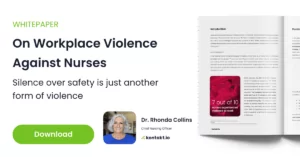Rhonda Collins, DNP, RN, FAAN is the Chief Nursing Officer at Kontakt.io where she brings the experience and insight gained from throughout her illustrious 35-year career to bolster our mission of bringing operational excellence to healthcare systems. Through asset tracking, staff safety, and AI-powered data analysis, Kontakt.io delivers outcomes that increase efficiency, improve productivity, and cut costs for customers including HCA, Riverside Healthcare, NGHS, and more.
Recently, Dr. Rhonda Collins hosted a live Ask Me Anything (AMA) webinar on staff safety and AI in healthcare to help shed light on these critical topics. You can watch the full video here and below are five highlights of Dr. Rhonda answering questions submitted by our audience viewers.
If you’re looking for more information on artificial intelligence in healthcare or the growing epidemic of workplace violence against nurses and clinical staff, take a look at our ebooks on the subjects. Meanwhile, dive into Dr. Rhonda’s AMA video clips.
How can artificial intelligence help keep nurses safe?
“When you do patient assessments that maybe identify a patient that has some has, in the past proven to have violent or unpredictable tendencies, then marrying that in data that that prediction of patient behavior, with events, time of day location, wait times all of those things that go together for the patient experience that can help you then predict what could happen in the future with other patients or this particular patient.”
What do real-time location systems (RTLS) look like in terms of clinical workflow over the next five years?
“My elevator statement about real time location systems is that it finds people places and things, that’s what it does, it binds them accurately, not based off of just an access area, but exactly where they are exactly at that time, that sort of thing. And so that’s the huge benefit to it.”
How does artificial intelligence assist in healthcare, particularly in bedside nursing?
“On the operational side, the data can predict discharge dates, complications, weight times, treatment times, all that sort of thing based on the diagnosis when they first come in the hospital. That is, and then what it does clinically is predict early signs of sepsis, potential problems, you know, medication reconciliation.”
What are the limitations of AI utilization in hospitals?
“AI aids in data driven decision making and administrative tasks, but it lacks the emotional intelligence or empathy, our nuanced understanding that’s crucial to nursing care. Nursing nurses, and the healing power of touch will not be replaced.”

